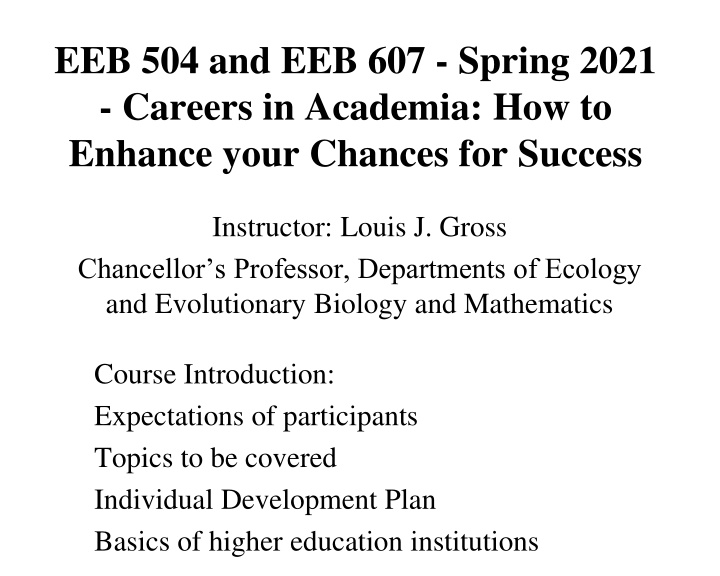
Enhancing Success in Academic Careers: Strategies and Insights
Join the seminar on Careers in Academia to learn essential skills and insights for academic success. Topics include navigating higher education institutions, faculty roles, career stages, mentoring, teaching enhancement, communication skills, and more. Gain valuable knowledge to excel in academia!
Download Presentation

Please find below an Image/Link to download the presentation.
The content on the website is provided AS IS for your information and personal use only. It may not be sold, licensed, or shared on other websites without obtaining consent from the author. If you encounter any issues during the download, it is possible that the publisher has removed the file from their server.
You are allowed to download the files provided on this website for personal or commercial use, subject to the condition that they are used lawfully. All files are the property of their respective owners.
The content on the website is provided AS IS for your information and personal use only. It may not be sold, licensed, or shared on other websites without obtaining consent from the author.
E N D
Presentation Transcript
EEB 504 and EEB 607 - Spring 2021 - Careers in Academia: How to Enhance your Chances for Success Instructor: Louis J. Gross Chancellor s Professor, Departments of Ecology and Evolutionary Biology and Mathematics Course Introduction: Expectations of participants Topics to be covered Individual Development Plan Basics of higher education institutions
Some of what is in these are topics we will discuss, but mostly we will focus on careers
Outline of course topics: Types of higher education institutions; How colleges and universities work; Where the money comes from and where it goes; Various roles of a faculty member and prioritizing among them; Stages of a career; Planning for transitions in career stages; Position searches and how to apply; Mentoring - getting it and giving it; Enhancing your teaching; Building your communication capabilities; Administrators and how they impact your career; Effectively preparing for evaluations at various levels; Funding your scholarship; Participating in the broader academic community in your field; Building effective collaborations; Combining your personal life and academic expectations; Time management.
Your feedback on these topics: I expect that you have already had exposure to some aspects of these topics such as writing a basic funding proposal, giving talks and posters, and teaching pedagogy. It would be helpful to have your assessment of what you have seen in these topics (e.g. the entire process of writing funding proposals vs. the basics of a good proposal) so that we can prioritize discussions for this term.
Basic tenet of this seminar: There are those in positions in academia that essentially ignore most all of the topics listed, do not care to be knowledgeable about the organizational structure of their institution, and just wish to do their work. They can certainly be successful while ignoring most everything we will discuss. The tenet of this seminar is that knowledge is power, that you can more readily prepare yourself for success in an academic position if you are knowledgeable, and that there are internal political issues at every higher education institution that you might best be served by being prepared to deal with. Example: NIMBioS
Individual Development Plan: The concept here is that it will assist you in your consideration of your career by being proactive about what your objectives are, what your strengths and values are, and what processes you might follow to help you get where you want to be. A typical interview question is where do you want to be in 5-years and an IDP is one method to help you address this in a somewhat formalized manner. There are a variety of tools available to assist (not to mention life coaches and your graduate mentors serve in that role to some extent), but I suggest starting with the tools available through AAAS Science Careers.
Types of Institutions: Private/Public Systems Non-profit/For profit R1, 2, 3 Carnegie Comprehensive Land-grant 4 year (PUI) Primarily Undergraduate 2 year (Community College) MSI Minority-serving, HBCU, Tribal College (specialty, Arts, Graduate, Medical) Liberal Arts Alternative
